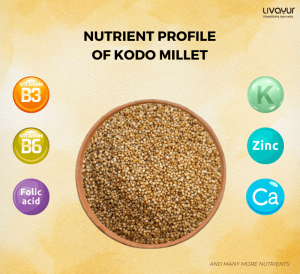This article is reviewed by an expert

Have you ever used celery or celery seeds? Also known as Ajmoda in India, it is popular as a spice and is often used in pickles and chutneys.
However, apart from its culinary use, celery or Ajmoda also offers numerous benefits to the body and mind.
In this article, let’s discover the many health benefits of celery and also get an insight into its Ayurvedic view.
Celery Benefits
- Anticancer Properties (1)
- Primary Benefits: Celery seeds or Ajmoda contain various compounds like apigenin, flavonoids, tannins, and phenolic compounds that exhibit anticancer activity.
- Secondary Benefits: Several studies have also shown that celery seed extracts inhibit the growth of cancer cell lines, including acute lymphoblastic leukaemia, glioma, breast cancer, neuroblastoma, and cervical carcinoma cells.
- Diabetes Management (1)
- Primary Benefits: Research shows that celery seeds or Ajmoda help reduce blood glucose levels and increase insulin secretion.
- Secondary Benefits: In addition, celery seeds are also known to help in the proliferation of pancreatic beta-cells, reducing oxidative stress, preserving beta-cell integrity and inhibiting the action of aldose reductase, an enzyme involved in the development of diabetes complications.
- Blood Pressure Regulation (1)
- Primary Benefits: Components like 3 n-butylphthalide (NBP), apigenin, and linalool present in celery seeds act as potent hypotensive agents.
- Secondary Benefits: Additionally, celery seed extracts have shown antihypertensive effects by acting as calcium channel blockers, improving blood flow, and exerting vasorelaxant effects.
- Improved Lipid Profiles (1)
- Primary Benefits: Celery seed extracts have demonstrated a hypolipidemic effect by reducing serum total cholesterol, triglycerides, and LDL cholesterol levels.
- Secondary Benefits: Furthermore, studies show that they also help inhibit hepatic cholesterol biosynthesis, enhance the activity of plasma lecithin cholesterol acyltransferase, and reduce lipid absorption in the intestine.
- Antioxidant Protection (1)
- Primary Benefits: Rich in phytochemicals like flavonoids, alkaloids, and phenolic compounds, celery seeds interfere with oxidative agent metabolism and protect cells from damage.
- Secondary Benefits: Furthermore, celery seed extracts enhance the activity of antioxidant enzymes like superoxide dismutase (SOD), catalase (CAT), and glutathione reductase, thereby reducing oxidative stress.
- Antimicrobial Activity (1)
- Primary Benefits: Celery seeds exhibit potent antimicrobial properties against various pathogenic bacteria and fungi, including Listeria monocytogenes and Salmonella enterica.
- Secondary Benefits: Celery seed extracts have also shown antibacterial activity against urinary pathogens, including Escherichia coli and Pseudomonas aeruginosa, and antifungal activity against Candida species.
- Gut Health Benefits (1)
- Primary Benefits: Celery seeds or Ajmoda have been traditionally used to alleviate gut-related issues such as abdominal pain, flatulence, and visceral spasms.
- Secondary Benefits: Additionally, research shows that celery seeds contain potent antiulcer properties that may help prevent peptic ulcers.
- Liver Protection (2)
- Primary Benefits: Celery seed extract has shown promising results in protecting the liver from damage caused by paracetamol and carbon tetrachloride.
- Secondary Benefits: Research also suggests that the methanolic extract of celery seeds effectively shields the liver, making it a potential natural remedy for liver-related issues.
- Anti-Inflammatory and Analgesic Effects (2)
- Primary Benefits: Certain compounds present in celery seeds exhibit anti-inflammatory and analgesic properties.
- Secondary Benefits: These properties can help alleviate inflammation and reduce pain in conditions, like arthritis, joint discomfort, and inflammatory diseases.
- Diuretic and Urinary Antiseptic (2)
- Primary Benefits: Celery is known for its strong diuretic properties, aiding in the elimination of excess water and toxins from the body.
- Secondary Benefits: Additionally, the volatile oil called apiol found in celery acts as a urinary antiseptic, supporting a healthy urinary system.
- Nervous System Support (2)
- Primary Benefits: Essential oil derived from celery has been reported to have a calming effect on the central nervous system.
Secondary Benefits: Its constituents have also shown antispasmodic, sedative, and anticonvulsant actions, promoting relaxation and potentially assisting in managing conditions, like anxiety and seizures.
Ayurveda on Celery (3)
Celery is called Ajmoda in Ayurveda. It is considered Katu (pungent) and Tikta (bitter) in taste and tends to exhibit Laghu (light) and Ruksha (dry) properties. Additionally, it has a hot potency (Virya) and a pungent post-digestive effect (Vipaka).
Owing to these properties, celery of Ajmoda is used to treat various conditions, such as diarrhoea and dysentery, Vata-related voice disorders, urinary bladder stones, indigestion and loss of appetite, Amavata or rheumatoid arthritis, impurity of breast milk caused by Vata, depression, sleeplessness, and rheumatic pain in the muscles of the neck and sacrum.
Disclaimer: Before incorporating any herb or remedy into your routine, always consult with a qualified Ayurvedic practitioner to ensure it suits your specific needs and health condition.
How To Use Celery at Home?

- Eat raw celery stalks as a crunchy and refreshing snack or chop them and add it to salads.
- Use celery in soups and stews to enhance the overall taste of the dish.
- Blend celery to create juices or smoothies.
- Add celery seeds to spice blends like garam masala, curry powder, and chaat masala.
- Include celery seeds in pickles and chutneys to create a unique flavour.
- Use celery seeds as a seasoning for soups, salads, and stir-fries.
Celery Side Effects and Contradictions (2)
- Celery contains volatile oils that can have an irritating effect on the kidneys. Therefore, people with acute kidney conditions should avoid consuming celery.
- Pregnant women should also exercise caution when it comes to consuming celery. The volatile oils present in celery have been found to stimulate menstruation and potentially cause pregnancy complications.
- Celery is associated with increased photosensitivity which can make the skin more sensitive to sunlight. Therefore, it is advised to take precautions, such as using sunscreen and limiting sun exposure, if you consume celery regularly.
- Remember that while celery is generally safe for common use, excessive intake may lead to kidney inflammation. Hence, it is important to consume celery in moderation and maintain a balanced diet to avoid any adverse effects.
On a Final Note
Celery, also known as Ajmoda, offers numerous health benefits, including anticancer properties, diabetes management, blood pressure regulation and liver protection. Ayurveda also extensively uses celery and celery seeds to prepare herbal formulations to treat numerous diseases.
However, it is important to be aware of the potential side effects of celery and eat it in moderation to avail of its benefits.
FAQs
- Can celery help with weight loss?
Yes, celery can aid in weight loss due to its low-calorie and high-fibre content. It provides a feeling of fullness and can be included in a healthy, balanced diet for weight management.
- Is celery safe for children?
Celery is generally safe for children and can be a healthy addition to their diet. However, it is important to introduce it gradually and watch for any allergic reactions or digestive issues.
- Can celery cure cancer?
While celery contains compounds with potential anticancer properties, it is not a cure for cancer. It may have a supportive role in cancer prevention and management, but medical treatment is essential for cancer care.
- Can celery interact with medications?
Celery may interact with certain medications, particularly those that affect blood clotting or blood pressure. If you are taking medications, it’s important to consult your healthcare provider before consuming celery regularly.
Disclaimer: The information provided here is for general information and not meant to substitute any medical advice. Please consult your doctor for appropriate medical consultation.
























